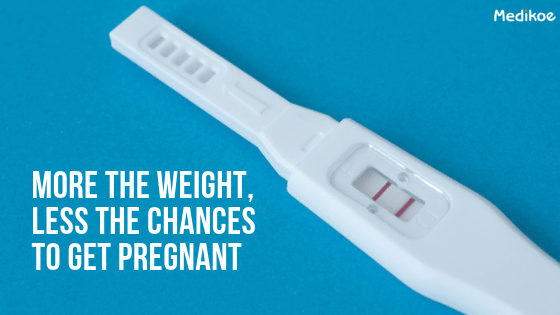More the weight, less the chances to get pregnant
Author : Dr. Monica Sachdeva
Date : 23 Nov 2019
"You lose weight, You gain fertility.",speaks Dr. Monica Sachdeva. Obesity technically means body mass index more than 30 kg/metre square. This is a menace in our so called developed modern world.
We are living in an era where processed food are routine,junk food the "in " thing and lack of physical activity is a habit now. Obesity is leading to various lifestyle diseases like Diabetes, Hypertension, Joint problems etc. This disease is affecting fertility too.
These are the ways obesity hampers fertility-
1. Obesity affects hormones
When BMI goes past overweight category(25-29-9 kg/meter square) to obese category, our natural hormones go for a topsy turvy. This starts affecting the menstrual pattern too.
2. Obesity increases insulin resistance
Obesity leads to increased insulin resistance which is the first milestone in road to diabetes. This also leads to anovulation i.e ovaries just don't produce eggs.
3. Obesity effects male partner too
Obesity reduces testosterone (male hormone) in male partner so reduces sperm quantity and quality. Erectile dysfunction also is found in obese males,a frustrating cause of male infertility.
4. Obesity increases chances of miscarriages
Obesity adversely effects both natural and assisted pregnancy. It is a nuisance for normal pregnancy outcomes leading to miscarriages, preterm delivery, high BP, difficult delivery and increased chances of caesarean section.
5. Obesity effects psychological state in women
Already infertility is mentally taxing affair,with presence of obesity the psychological stress doubles up worsening the condition even more.
Solution-
Attaining a normal BMI solves many problems.Infertile couple parenthood once they lose weight.
The success of ART procedures increases manifold once women attains normal BMI.Many a times couples conceive naturally and don't require IVF procedure. Serum AMH(predictor of ovarian reserve )was measured at baseline and following 12 weeks of supervised aerobic exercise. They conclude that the change in AMH levels correlated significantly with physical activity, therefore the doctors claim that a moderate aerobic training for 12 weeks had a positive significant effect on reproductive functions via modulating adiposity, AMH and fertility in obese women with or without PCOS.

